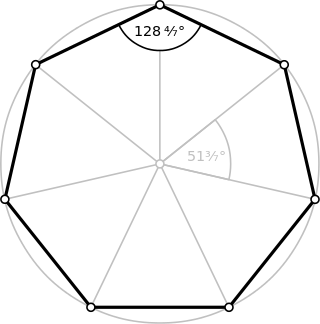In mathematics, a field F is algebraically closed if every non-constant polynomial in F[x] has a root in F.
In mathematics, an algebraic extension is a field extension L/K such that every element of the larger field L is algebraic over the smaller field K; that is, every element of L is a root of a non-zero polynomial with coefficients in K. A field extension that is not algebraic, is said to be transcendental, and must contain transcendental elements, that is, elements that are not algebraic.
In mathematics, particularly abstract algebra, an algebraic closure of a field K is an algebraic extension of K that is algebraically closed. It is one of many closures in mathematics.

In mathematics, a field is a set on which addition, subtraction, multiplication, and division are defined and behave as the corresponding operations on rational and real numbers. A field is thus a fundamental algebraic structure which is widely used in algebra, number theory, and many other areas of mathematics.
In mathematics, particularly in algebra, a field extension is a pair of fields , such that the operations of K are those of L restricted to K. In this case, L is an extension field of K and K is a subfield of L. For example, under the usual notions of addition and multiplication, the complex numbers are an extension field of the real numbers; the real numbers are a subfield of the complex numbers.
In algebra, a homomorphism is a structure-preserving map between two algebraic structures of the same type. The word homomorphism comes from the Ancient Greek language: ὁμός meaning "same" and μορφή meaning "form" or "shape". However, the word was apparently introduced to mathematics due to a (mis)translation of German ähnlich meaning "similar" to ὁμός meaning "same". The term "homomorphism" appeared as early as 1892, when it was attributed to the German mathematician Felix Klein (1849–1925).
In category theory, an epimorphism is a morphism f : X → Y that is right-cancellative in the sense that, for all objects Z and all morphisms g1, g2: Y → Z,
In mathematics, in particular abstract algebra, a graded ring is a ring such that the underlying additive group is a direct sum of abelian groups such that . The index set is usually the set of nonnegative integers or the set of integers, but can be any monoid. The direct sum decomposition is usually referred to as gradation or grading.
In mathematics, an irreducible polynomial is, roughly speaking, a polynomial that cannot be factored into the product of two non-constant polynomials. The property of irreducibility depends on the nature of the coefficients that are accepted for the possible factors, that is, the ring to which the coefficients of the polynomial and its possible factors are supposed to belong. For example, the polynomial x2 − 2 is a polynomial with integer coefficients, but, as every integer is also a real number, it is also a polynomial with real coefficients. It is irreducible if it is considered as a polynomial with integer coefficients, but it factors as if it is considered as a polynomial with real coefficients. One says that the polynomial x2 − 2 is irreducible over the integers but not over the reals.
In mathematics, a transcendental extension is a field extension such that there exists an element in the field that is transcendental over the field ; that is, an element that is not a root of any univariate polynomial with coefficients in . In other words, a transcendental extension is a field extension that is not algebraic. For example, and are both transcendental extensions of
In abstract algebra, a subset of a field is algebraically independent over a subfield if the elements of do not satisfy any non-trivial polynomial equation with coefficients in .
Field theory is the branch of mathematics in which fields are studied. This is a glossary of some terms of the subject.
In field theory, a branch of algebra, an algebraic field extension is called a separable extension if for every , the minimal polynomial of over F is a separable polynomial. There is also a more general definition that applies when E is not necessarily algebraic over F. An extension that is not separable is said to be inseparable.
In mathematics, especially in the field of algebra, a polynomial ring or polynomial algebra is a ring formed from the set of polynomials in one or more indeterminates with coefficients in another ring, often a field.
In algebra, a field k is perfect if any one of the following equivalent conditions holds:
In commutative algebra and field theory, the Frobenius endomorphism is a special endomorphism of commutative rings with prime characteristic p, an important class that includes finite fields. The endomorphism maps every element to its p-th power. In certain contexts it is an automorphism, but this is not true in general.
Transcendental number theory is a branch of number theory that investigates transcendental numbers, in both qualitative and quantitative ways.
In field theory, a simple extension is a field extension that is generated by the adjunction of a single element, called a primitive element. Simple extensions are well understood and can be completely classified.
In mathematics, E-functions are a type of power series that satisfy particular arithmetic conditions on the coefficients. They are of interest in transcendental number theory, and are more special than G-functions.
In commutative algebra, an element b of a commutative ring B is said to be integral over a subring A of B if b is a root of some monic polynomial over A.























